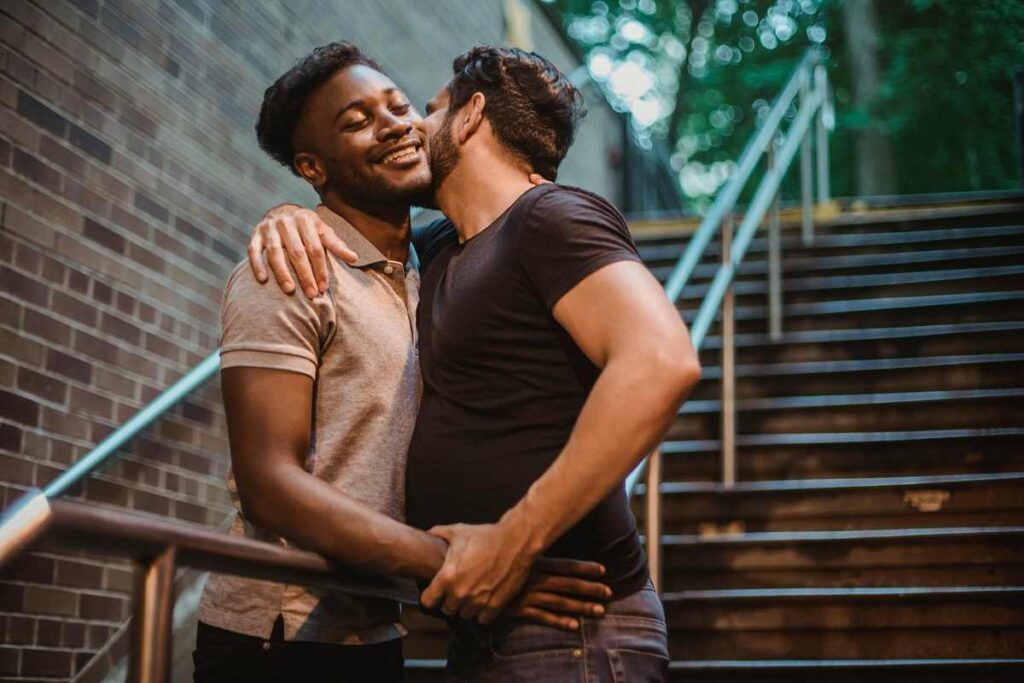
In text messaging and online communication, “FWB” stands for “Friends with Benefits.” This term refers to a relationship where two individuals are friends but also engage in casual sexual activities without the expectations or commitments of a traditional romantic relationship.
The “benefits” part refers to the sexual component of the relationship. “FWB” relationships can involve either gay or straight friends or other sexualities.
Key Characteristics of FWB Relationships:
- Casual and Non-Exclusive:
- FWB relationships are typically casual and not exclusive. Both parties may date or engage in relationships with other people simultaneously.
- Lack of Romantic Commitment:
- There is generally no expectation of romantic commitment, such as dating exclusively, making future plans together, or integrating into each other’s personal lives deeply.
- Friendship Basis:
- The individuals involved are friends first, with mutual respect and affection, but the relationship includes a sexual component.
- Communication:
- Clear and open communication is crucial to ensure both parties understand the nature of the relationship and to avoid misunderstandings or hurt feelings.
- Boundaries:
- Setting boundaries and discussing expectations can help maintain the friendship and prevent complications or emotional attachment beyond what both parties agree upon.
Usage in Conversation:
- “Are you and Alex dating?”
- “No, we’re just FWB.”
- “I don’t want anything serious right now, just looking for a FWB situation.”
Understanding this term and the dynamics it implies can help in navigating conversations and relationships where this type of arrangement is discussed or considered.
Are “FWB” relationships more common in gay or lesbian relationships?
The prevalence of “Friends with Benefits” (FWB) relationships can vary widely based on cultural, social, and individual factors. While it’s challenging to definitively state whether FWB relationships are more common in gay relationships compared to heterosexual relationships, some factors may contribute to their frequency in the LGBTQ+ community.
For one, the LGBTQ+ community often provides a supportive environment where non-traditional relationships are more accepted and understood, potentially making FWB relationships more common.
Additionally, in smaller or close-knit LGBTQ+ communities, people might be more likely to form various types of relationships, including FWB, due to the limited number of potential partners. Historically too, gay men, in particular, have been at the forefront of sexual liberation movements, which may contribute to a greater acceptance and practice of casual sexual relationships, including FWB romances.
FWB relationships can offer the benefits of companionship and sexual intimacy without the demands of a full-time romantic relationship, which can be appealing to those with busy lifestyles or those not seeking long-term commitments. FWB can provide a way to explore sexual identity and preferences in a safe and trusted environment, which can be particularly important for those in the LGBTQ+ community.
Other things to know about “FWB” relationships
“Friends with Benefits” (FWB) relationships can be appealing to some due to their flexibility and lack of traditional relationship pressures. However, they come with their own set of dynamics and potential challenges.
Here are some important aspects to consider:
Emotional Dynamics
- Risk of Developing Feelings:
- Attachment: One or both parties might develop romantic feelings over time, which can complicate the relationship.
- Communication: Regular check-ins about feelings and boundaries are crucial to ensure both parties remain on the same page.
- Jealousy and Insecurity:
- Non-Exclusive Nature: Since FWB relationships are often non-exclusive, jealousy can arise if one person starts seeing others more seriously.
- Transparency: Being open about other relationships and respecting each other’s feelings can help mitigate these issues.
Social Dynamics
- Impact on Social Circles:
- Friend Groups: If the individuals share mutual friends, the FWB relationship can affect the larger social dynamic, potentially leading to awkwardness or gossip.
- Discretion: Deciding how much to share with mutual friends and handling social situations delicately can help maintain harmony.
- End of the FWB Relationship:
- Friendship Continuity: It’s important to discuss what happens if the sexual aspect ends. Will the friendship continue, or will it be affected?
- Exit Strategy: Having an exit strategy or understanding what happens next can prevent hurt feelings and preserve the friendship.
Practical Considerations
- Sexual Health:
- Protection: Using protection and discussing sexual health openly is vital to avoid sexually transmitted infections (STIs).
- Testing: Regular STI testing and sharing results can help ensure both parties’ health and safety.
- Boundaries:
- Clear Boundaries: Establishing clear boundaries about what is and isn’t acceptable can prevent misunderstandings. This includes physical, emotional, and social boundaries.
- Respect: Both parties should respect each other’s boundaries and communicate any changes.
Long-Term Viability
- Changing Needs:
- Life Changes: As life circumstances change (new relationships, moving, job changes), the nature of the FWB relationship might need to be reassessed.
- Flexibility: Being flexible and willing to adapt to changing situations can help maintain the relationship positively.
- Mutual Benefit:
- Balance: Both parties should feel that the relationship is mutually beneficial. If one person starts to feel more used or neglected, it’s time to re-evaluate.
- Regular Check-Ins: Periodically discussing the arrangement to ensure it continues to work for both parties is key.
Potential Pitfalls
- Misaligned Expectations:
- Future Goals: If one person starts seeing the FWB relationship as potentially leading to something more serious while the other does not, it can lead to disappointment.
- Honesty: Being honest about intentions and future expectations can prevent hurt feelings.
- Emotional Baggage:
- Past Relationships: Bringing unresolved issues from past relationships into an FWB situation can complicate things.
- Self-Reflection: Understanding one’s own emotional state and readiness for a casual relationship is important.
Conclusion
FWB relationships can offer a lot of flexibility and enjoyment if both parties are clear about their intentions and maintain open, honest communication. However, they require careful navigation of emotions, boundaries, and social dynamics to ensure they remain positive and fulfilling for both individuals.


